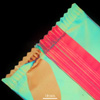Micrograph Library
Browse the libraryAdvanced searchSystemsCompositionsTechniquesKeywordsPhase diagramsHelpPreferencesAbout the micrograph libraryTerms of useContribute micrographs!FeedbackLinksCredits Print this page

Full Record for Micrograph 572

[133 KB]
View micrograph
.. in new window
View micrograph and record
.. in new window
You can also view and download the micrographs on Flickr
- Micrograph no
- 572
- Brief description
- Birefringence in a film of polypropylene
- Keywords
- alignment, birefringence
 , extrusion
, extrusion  , film, polymer
, film, polymer  , polypropylene (PP)
, polypropylene (PP) - Categories
- Polymer
- System
- Polypropylene (PP)
- Composition
- Not specified
- Standard codes
- Reaction
- Processing
- This film is made by biaxially stretching heated material during the extrusion process.
- Applications
- Polypropylene has good resistance to chemicals and to fatigue. It is widely used in food packaging in the form of rigid tubs, lids and screw-tops as well as in flexible (but inextensible) films.
- Sample preparation
- The packet has been torn open, to demonstrate its inextensibility
- Technique
- Cross-polarised light microscopy
- Length bar
- 10 mm
- Further information
- The colours in the image are the result of birefringence and relate to the residual stress in the film, following the biaxial stretching process. The uniformity of the colour (with contrast only where an additional thickness of film exists or where wrinkling has resulted in a different apparent thickness) is indicative of both a uniform film thickness and of the uniformity of the drawing process used to make the film. Note that unlike polyethylene, the film has not been permanently strained in the region of the tear. This is because the monomer is bulkier and the material is relatively close to its glass transition temperature (~8 deg C for PP, ~-30 deg C for PE). Chain alignment and subsequent sliding is therefore much more sluggish and does not occur readily under an applied stress.
- Contributor
- J A Curran
- Organisation
- Department of Materials Science and Metallurgy, University of Cambridge
- Date
- 03/10/02
- Licence for re-use
 Attribution-NonCommercial-ShareAlike 4.0 International
Attribution-NonCommercial-ShareAlike 4.0 International

